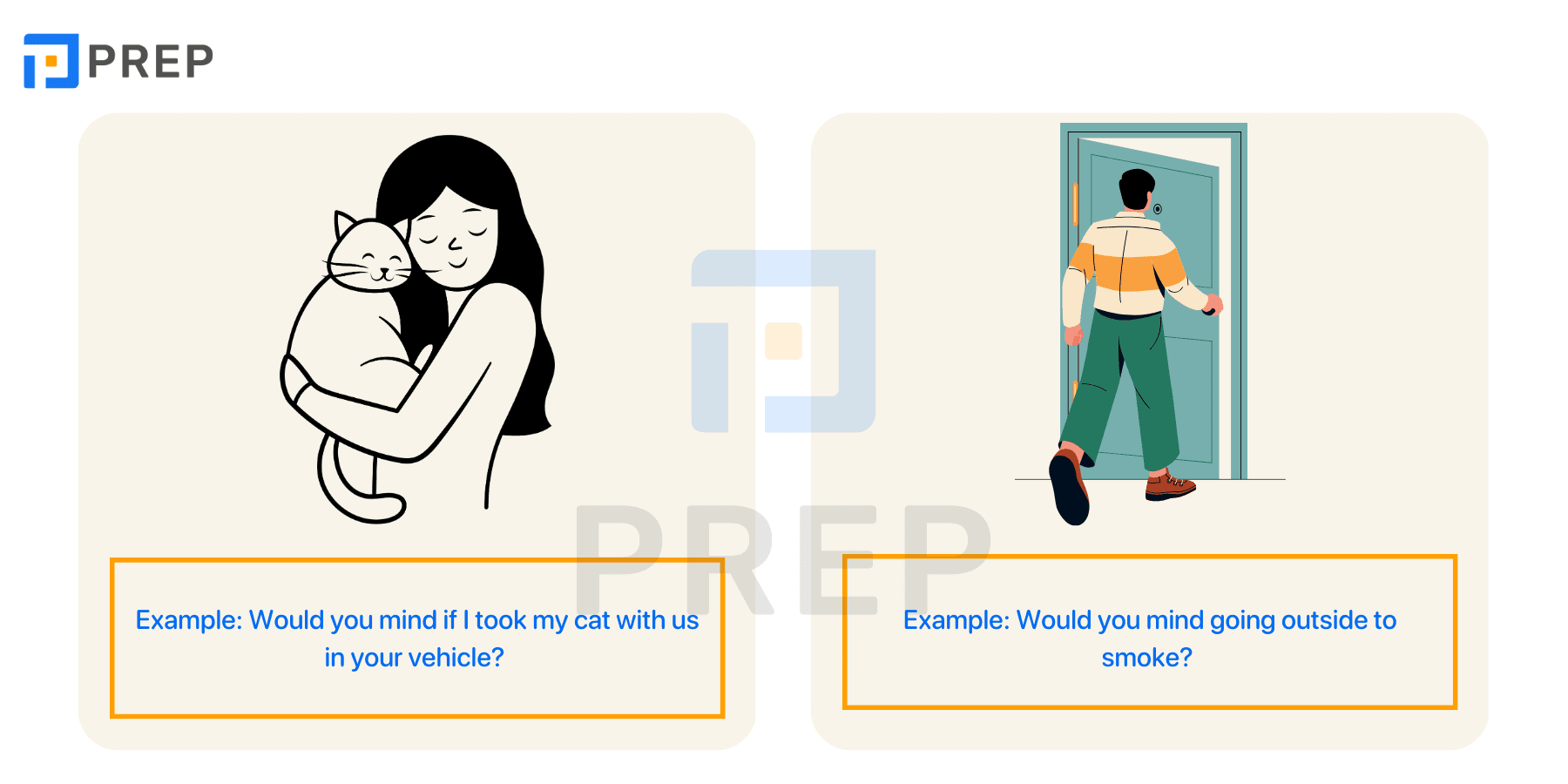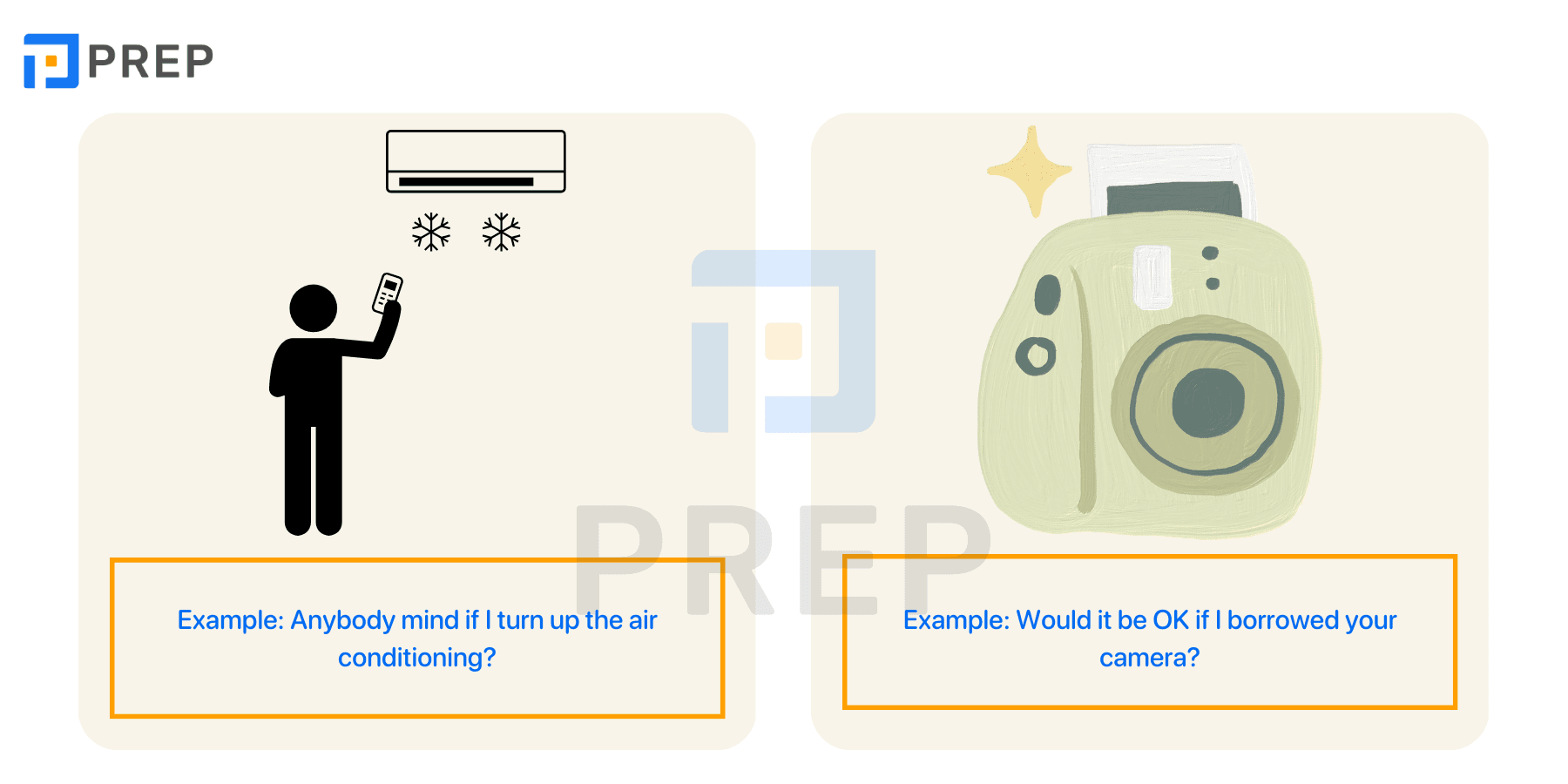Would You Mind in English: Meaning, Use and Examples
“Would you mind” is a common English structure used to make polite requests in both formal and informal conversations. In this guide, you’ll learn its true meaning, grammar rules, common mistakes to avoid, and how to use it naturally in speaking, writing, and exam situations.

I. What Does Would You Mind Mean in English?
The phrase “Would you mind” is a common and polite way to make requests or ask for permission in English. It softens the request and shows respect to the listener, making it ideal for both formal and informal situations such as conversations at work, with strangers, or during speaking exams.

II. How to Use Would You Mind Correctly
Understanding how to use Would You Mind in English is essential if you want to speak politely and appropriately in both everyday conversation and professional communication. This phrase is often used to make indirect requests or to ask for permission in a respectful way.
There are two main sentence structures that English learners need to know. Each follows a unique grammatical pattern but serves a similar purpose: softening the tone of a request.

1. Sentence structure: Would you mind + V-ing
This is the most common way to ask someone to do something for you. Using this form helps you sound more polite and considerate—critical skills when communicating in English.
Grammar pattern: Would you mind + verb-ing (gerund form)
Examples:
- Would you mind waiting a moment?
- Would you mind turning down the volume?
- Would you mind helping me carry this?
Key points:
- Always use the -ing form after “mind.”
- The request usually relates to an action in the present or near future.
- This structure is acceptable in formal and informal settings, including IELTS Speaking.
Common mistake:
- Incorrect: Would you mind to close the door?
- Correct: Would you mind closing the door?
2. Alternative structure: Would you mind if + S + Verb (past)
This pattern is used when you are asking permission or checking whether something would be acceptable.
Grammar pattern: "Would you mind if" + subject + past simple verb
Examples:
- Would you mind if I used your laptop?
- Would you mind if we arrived a bit later?
- Would you mind if she joined the meeting?
Important grammar note:
- Although the verb is in the past simple, the meaning refers to the present or future.
- This form of "Would You Mind in English" is slightly more formal and useful in workplace, academic, or exam settings.
Common mistake:
- Incorrect: Would you mind if I will sit here?
- Correct: Would you mind if I sat here?
3. Common Mistakes When Using Would You Mind
While Would You Mind in English is a polite and useful phrase, learners frequently make mistakes that can affect clarity or sound unnatural. Below are the most common errors—along with explanations and ways to fix them.
Using the wrong verb form
A frequent mistake is using the infinitive form (to + verb) instead of the -ing form after "would you mind". Remember: when "Would you mind" is followed by an action, the next verb must be in the gerund form (verb-ing), not the infinitive.
- Incorrect: Would you mind to help me with this?
- Correct: Would you mind helping me with this?
Answering the question incorrectly
Because "Would you mind" is a negative question, it can be confusing to respond appropriately. Many learners make the mistake of saying "yes" when they mean "no problem". In standard English communication, a negative answer is actually the positive response.
Example:
- Question: Would you mind opening the door?
- Answer: No, not at all. (This means: I don’t mind. I will do it.)
- Answer: Yes, I would. (This means: I do mind. I prefer not to.)
Forgetting to adjust the verb tense with "if" clauses
When using the structure "Would you mind if + subject + verb", the verb should be in the past simple. Even though the speaker refers to a present or future action, the verb form still follows past simple to maintain politeness and grammatical accuracy.
- Incorrect: Would you mind if I open the window?
- Correct: Would you mind if I opened the window?
Making these small adjustments can help you sound more natural, polite, and confident when using Would You Mind in English in real communication.
II. Would You Mind in Real Conversations
Using “Would You Mind in English” is not just about grammar—it’s about knowing how to speak politely in real-life situations. This phrase is widely used in both informal and professional contexts to make requests in a respectful and non-direct way.
In informal daily life settings, the phrase is often used when making polite requests to strangers, acquaintances, or even friends.
Examples:
- “Would you mind closing the window? It’s a bit cold.”
- “Excuse me, would you mind letting me through?”
Even in relaxed situations, using this structure shows that you are thoughtful and respectful of others.
In professional or workplace settings, this phrase is widely used to maintain formality and minimize directness when asking for something.
Examples:
- “Would you mind reviewing this report before tomorrow?”
- “Would you mind turning off your microphone?”
- “Would you mind waiting while I check the system?”
In these contexts, “Would You Mind in English” helps you express requests politely, build positive rapport, and reduce the risk of sounding too forceful.
Whether you're requesting help from a friend or addressing a manager, “Would you mind” is a practical phrase that makes your English sound more polite and fluent.
III. Using Would You Mind in IELTS and Formal Exams
The phrase Would you mind in English frequently appears in language exams such as IELTS, TOEIC, and OET, especially in sections that assess polite requests, suggestions, or workplace communication. Knowing how to use this structure fluently helps you sound natural and respectful—an essential trait for high scores in speaking and writing components.
In IELTS Speaking
Part 1 & 3: Examiners may evaluate your ability to express polite requests or respond to hypothetical social situations.
Common questions:
- Would you mind telling me about your daily routine?
- Would you mind if I asked about your hobbies?
Sample response: No, not at all. I usually start my day by jogging for 30 minutes...
Being able to respond politely and mirror the structure will earn higher marks for coherence and interaction.
In IELTS Writing (especially General Training – Letters)
In Task 1 of the General Training module, formal or semi-formal letters often include polite requests. “Would you mind…” fits perfectly in these cases.
Example: Would you mind sending me the full itinerary before Friday?
Use it when writing to:
- a hotel manager
- an employer
- a university or training center
In TOEIC & OET Listening or Speaking
In TOEIC, test takers may hear or use “Would you mind” in workplace dialogues.
Example:
- Would you mind calling the client back?
- Would you mind postponing the meeting until 3 p.m.?
In OET, especially in the speaking test (role-play), healthcare professionals might use this expression with patients or colleagues to show politeness and empathy:
Example: Would you mind sitting down while I take your blood pressure?
IV. Equivalent structures to Would you mind
While Would You Mind in English is a polite and widely accepted way to make requests or ask for permission, there are several other expressions that serve a similar function. These alternative structures vary in tone—from neutral to very polite—and can be used depending on context, intention, and formality level.

|
Structure |
Example |
Formality Level |
Usage Notes |
|
Would you mind + V-ing |
Would you mind closing the door? |
Polite / Neutral |
Softens the request, common in both spoken and written English |
|
Could you / Could you please |
Could you please check this document? |
Polite / Direct |
Slightly more direct than "Would you mind"; widely used professionally |
|
Do you mind + V-ing |
Do you mind turning down the volume? |
Neutral / Informal |
Similar to "Would you mind" but less formal; suitable for friendly settings |
|
Would you please + base verb |
Would you please take a seat? |
Formal |
Polite but a bit formal or commanding; often used in customer service |
|
Would it be possible to… |
Would it be possible to change the appointment time? |
Formal / Written |
Common in formal writing or careful spoken requests |
|
I was wondering if you could… |
I was wondering if you could sign this today. |
Very Polite / Indirect |
Often used in professional emails, offers softer tone than other structures |
By learning these equivalent structures, learners can diversify their language and adapt their tone depending on the situation. However, understanding “Would You Mind in English” remains a valuable starting point for mastering polite and respectful communication.
V. Exercises on Would you mind
Practice is essential to master the structure and nuance of “Would you mind” in real-life and exam settings. Below are some targeted exercises designed to help you apply this polite request form correctly and naturally.
Fill-in-the-Blank Practice
|
Complete the sentences below using the correct form of the verb:
|
Answer key:
|
Rewrite the Sentence
|
Rewrite the following requests using “Would you mind”:
|
Sample answers:
|
Identify the Error
|
Find the mistakes in the following sentences and correct them:
|
Correct versions:
|
The above is a comprehensive overview of the Would you mind in English. I wish you success in mastering this grammar knowledge for effective English communication. Let’s continue to explore more useful information every day, Preppies!

Hi I'm Chloe, and I am currently serving as an Product Content Administrator at Prep Education. With over five years of experience in independent online IELTS study and exam preparation, I am confident in my ability to support learners in achieving their highest possible scores.
Comment
Premium content
View allPersonalized roadmap
Most read












